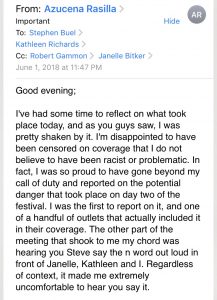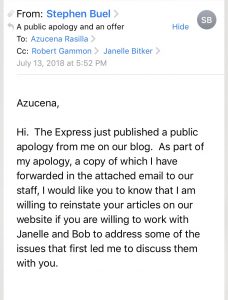Back in April, my editors at the East Bay Express gave me the OK to cover BottleRock, a three-day music festival that takes place in Napa Valley every year on Memorial Day weekend. It was the continuation of a dream: I had freelanced for the alt-weekly since 2016, got hired part-time for a while before becoming a full-time Associate Editor in the summer of 2017.
The Express is my hometown paper, and I grew up reading it. Adding my voice to the newsroom meant writing about the Black and Brown communities, whose stories often go untold even in the alt-weekly world.
My focus for BottleRock, I told Express managing editor Janelle Bitker, was whatever happened on the grounds — the attendees, the interactions with the musicians, the crowd, etc. I published three blog posts, one after each day of the festival, from May 26 through May 28. I also did Instagram stories all three days and some tweets from my account.
Nothing too out there. And I sure never expected the stories to lead to the end of my job—and indirectly lead to the resignation of Express publisher Stephen Buel.
**
On Friday, June 1, Bitker, Express Editor in Chief Kathleen Richards, and myself got called into an urgent meeting with Buel, owner of Telegraph Media, which publishes Express and other publications. He seemed agitated and pale as he handed us a stack of papers.
“I want you to know,” Buel told me in the conference room, in front of my editors, “that your coverage of BottleRock was not up to the standards of East Bay Express. You were being racist against white people, and I have removed the stories from the website.”
He did it without informing Richards, Bitker, or myself.

Buel announced that he didn’t want to be interrupted as he went over the problematic areas of my coverage, highlighted in red pen. He angrily scrolled through the papers, pointing out my “racism.”
One of the blog posts mentioned how the festival’s lineup only had two Latinx artists: Colombia’s Bomba Estéreo, and Mexican singer-songwriter Natalia Lafourcade. I also pointed out how during Bomba Estéreo’s set, the majority of those in the VIP and Platinum section were white, and that despite not understanding what lead singer Li Samuet’s quick and fiery freestyling was about, they were enjoying themselves—a point I made to show the universality of music.
Buel implied that I was calling white people “dumb” for not speaking Spanish, and it was the same as if he was to say that Mexican immigrants were dumb for not speaking English.
His comments got worse.
My coverage of Day Two included my discomfort that white folks sang along to the N-word during E-40’s performance.
“You know, if a rapper puts it in his lyrics,” he angrily said, “it’s free game for anyone to say “[he loudly said the N-word in front of the three women of color in the conference room, myself included].” Why didn’t you ask E-40 how he feels about his fans singing along?”
The Express editor in chief, managing editor, and myself looked at each other in horror. I angrily responded that no white, or Brown person had the right to use that word regardless of context. I also brought up an incident that took place in Alabama during a Kendrick Lamar show where a fan who was on stage with him sang along with the N-word. The rapper was quick to shut down the fan, schooling her on not using this racist word.
There was no apology for Buel having said the slur.

He shot back that the use of the N-word by rappers could be a whole separate story. I responded that a Black writer should write such a story, and I was not the writer to tackle this controversial issue (at East Bay Express, we only had one Black writer, our calendar editor who was working part-time. As far as Brown writers, I was the only one.)
Buel continued to nitpick the blog posts, unbothered with what had just transpired. For the last day of coverage, he had an issue with the headline: “The White Elitism of BottleRock Napa Valley.”
In the post, I mentioned how headliner Bruno Mars had called the festival “the fancy Coachella.” It was accurate, as Bottlerock primarily functions as a music festival for the rich. I called out the tiers of pricing, which topped out at $3,500. I also mentioned how the festival attendees were predominantly white.
How dare I question ticket prices if I got to go for free, Buel scolded. How dare I call out the festival for its lack of diversity? He used two examples: “We wouldn’t criticize a Mariachi festival or a hip-hop show like Blurry Vision (a new festival by GoldenVoice that recently took place in Oakland) for not having enough white attendees. Why are we criticizing BottleRock for their lack of Black and Brown attendees?”
He also told us that he would reach out to BottleRock and offer an apology for the coverage not being up to our editorial standards.
The meeting ended with Buel telling me I was not allowed to ever write anything that he deemed racially controversial. I asked if he had ever read any of my stories for the Express. Although my beat is arts and culture, I write about the intersectionality of race and social justice. I told him that I would no longer cover any shows or festivals, and instead would pitch them to other outlets.

I was crying by this point. I felt humiliated, powerless. I made it a point to tell Buel how despite working at East Bay Express full-time, wearing multiple hats, my salary was not enough.
I wasn’t just a writer. I had also taken over social media for all four publications under Telegraph Media. I uploaded the Express every week online and monitored web comments. I was also in charge of manually inputting music listings from over 35 venues around the East Bay.
I was working far more than 40 hours a week, my paycheck of $1,140 every two weeks was not enough for me to make ends meet, and I still had to freelance on the side, something many of us journos have to do.
All Buel said was that he understood.
The meeting ended, and I was still in tears. I asked Richards to let me go to work from home, but not before telling my colleagues of what had happened. They were shocked. At the end of the day, I talked to my mom and asked her for advice. I told her how I wanted to quit because I didn’t want to work under someone who censors my writing, and is tone-deaf on race relations in Trump’s America.
“Resign,” my mom firmly said. “Your dignity as a woman of color, and your integrity as a journalist is worth more. This won’t be the first or last time that you’ll work for a racist. Stand your ground.”
That night, I put in my two-week notice.
**
The following week in the Express newsroom was, to put it lightly, uncomfortable. Buel went on as if nothing happened. That Wednesday, we had our weekly editorial meeting. Buel’s wife, Judy Gallman, sits in that meeting, since she is the editor of the other three publications under Telegraph Media. Before the meeting, I had asked Express Editor in Chief Richards to let me have the last few minutes of the meeting to announce my resignation.
I told those in the meeting, interns included, how and why Buel had taken down my coverage of BottleRock. I also mentioned that I had put my two-week notice, and hoped that once I was gone, they would discuss what had transpired in the meeting because if word got out, it could be damaging to the paper.
Gallman was quick to intervene. She said that my coverage was racist and that Steve was committed to fighting racism, even racism against white people.
“Resign,” my mom firmly said. “Your dignity as a woman of color, and your integrity as a journalist is worth more. This won’t be the first or last time that you’ll work for a racist. Stand your ground.”
When two of my (white male) colleagues tried to explain how her vision of racism was twisted, she got defensive. She told us that we couldn’t tell her that as a white woman, she had not experienced racism. When we tried to explain the reasons why she was wrong, and why her husband was wrong, she said that Steve had been part of East Bay Express far longer than any of us sitting at the table.
After that uncomfortable meeting, I had one last face-to-face with Buel. In that brief meeting, he “apologized”—not for having taken down my stories (which he was still firm in calling them racist against white people), but for taking them down without telling my editors or I.
He said that next time he was to take down a story, he would be sure to tell the editor and writer beforehand. He did apologize for having said the N-word; when he was younger, he said, the use of the N-word could be discussed at arm’s length and he now realized that times have changed.
Tears welled up in his eyes. He said that he had to end a friendship with someone who could not stop saying the N-word. I said “Thank you,” and asked if I could leave because I had a lot of work to do.
The meeting didn’t last more than five minutes. He went back to his desk and got on a call. He didn’t show any signs of having felt distraught just minutes earlier.
The rest of that week is a blur. It was uncomfortable to be there, but I was determined to honor my two-week notice no matter what. That was until the following Tuesday when I went into the newsroom only to find that my email had been deactivated. When I asked the editor why, she blamed it on an IT error. My replacement was starting that day, and IT had activated her email and deactivated mine.
I felt disrespected. I had so much anger inside me, and I knew that I couldn’t stay any longer. I told my editor to consider that day as my last day, and that I would pack up my things and leave. I told her that I would come back at the end of the week to return my key, and pick up my final check.
**
The day I left, my last music feature for Express was published, and I also took the opportunity to announce my departure on Twitter. The amount of support I received was something I wasn’t expecting, and it restored my faith in knowing that no matter what, I would continue writing elsewhere.
My former colleagues at the Express have been a crucial support system. My endless gratitude especially to Beatrice Kilat. After I put in my resignation, Buel offered her my position, she turned it down, and instead, put in her resignation as well. I could have never asked her to quit her job; in doing so, she showed what true allyship looks like. She, like me, risked her livelihood to stand on the side of justice.
Also, Brian Breneman, who is still the Creative Director at the Express. From the moment it happened, he was the most vocal ally throughout this whole saga. He constantly confronted Buel, even behind the scenes. As a white man, he knew how to use his privilege in standing for what is right. I hope to one day work with both of them again.
The past month has been surreal. I’ve gone from feeling powerless and helpless, to enraged and appalled. I have been hesitant to share the reasons why I left East Bay Express. On one hand, I still genuinely care about the staff behind that puts out the paper every week — their work is crucial to the East Bay community.
East Bay Express is, after all, one of the last remaining alt-weeklies in the country, and a staple for readers who support the work of the journos who write for it.
On the other hand, situations such as the one that forced me to resign happen too often to women and people of color in journalism. Too many of us who go through such humiliations stay quiet for fear of losing their job or having their reputations tainted. I resigned because my integrity as a woman, as a journo of color, and my commitment to free press was worth more than a steady paycheck.

Buel’s decision to issue an “apology” on a Friday late afternoon—nearly a month after I resigned and one that did not adequately explain everything that happened—finally made realize that I had to go public. He even had the gall to email me after his apology had gone live and offer to republish my stories if I was willing to “address some of the issues that first led me to discuss them with you.”
Less than 24 hours after issuing his apology, Buel stepped down as publisher.
Despite my hesitations in sharing this publicly, I had to tell my truth. It’s unfair for faithful readers of the East Bay Express to be in the dark as to what is going on in the newsroom. I also knew that it was important to share this story in solidarity with other journos who have experienced something similar.
Diversity in newsrooms, starting with the ownership, is crucial for any publication. It broke my heart to have resigned from my dream job. How many journos can say that they get to write for their hometown paper? My heart also breaks for my former colleagues, and the folks in sales. Both sides work hard to publish a paper that the community loves and trusts.
It’s not fair that they have been dragged into this situation, their jobs potentially put in danger. They deserve better. There are few publications in the Bay, and they are struggling. People like Steve Buel do not deserve to own our beloved weekly.
I hope that in sharing this, others who were afraid to do so, speak up. It takes one person to speak up to injustices to spark change.
I still deeply care about East Bay Express, and the work that my former colleagues report on. My far-fetched wish is that a good Samaritan with a love for journalism buys the paper. This whole ordeal has taught me that anything is possible. I want to work for a publication that is inclusive and diverse. I am going to make it my mission to make it happen — whether I somehow miraculously start a publication from the ground up, or join someone with a clear vision of what it takes to make it happen.
Which leads me to Tom Hanks.

By Alexandra Hemmerly-Brown – Public Domain
Ever since the movie The Post came out, I have casually tweeted Hanks. He’s from Oakland, and despite his Hollywood status, Hanks has much love for the Bay Area. He’s a proud graduate of Chabot College in Hayward, just like me. During my time at Chabot I was part of The Spectator, the college newspaper, and KCRH, its radio station. The money Hanks made off his portrayal of former Washington Post editor Ben Bradlee is sufficient to start a publication in the East Bay.
Tom, if you’re reading this: call me!
Because while Buel’s resignation is a step in the right direction, significant changes at the Express will not occur until a new owner with adequate funds, a true love for journalism, and a connection to the East Bay takes over. The journos who are no longer at East Bay Express—and readers—deserve better.
Azucena Rasilla is a freelance journalist from Oakland, masochist A’s fan, and proud of her Mexicana roots.
Feedback, thoughts, commentary, tips, rants? Send them to mexicanwithglasses@gmail.com










